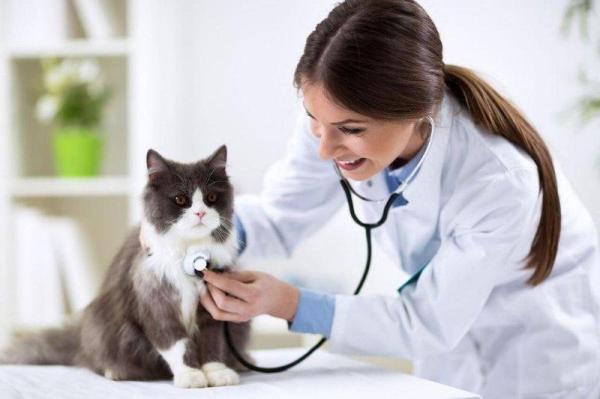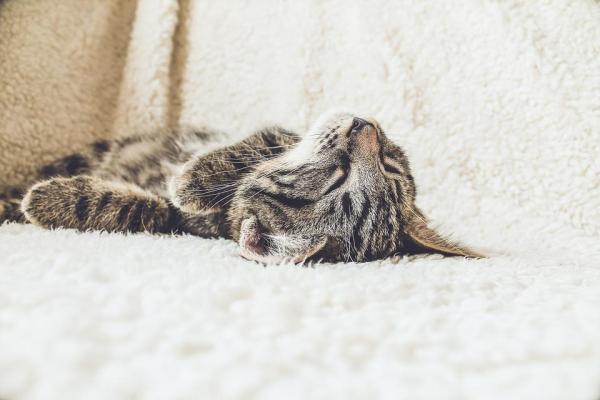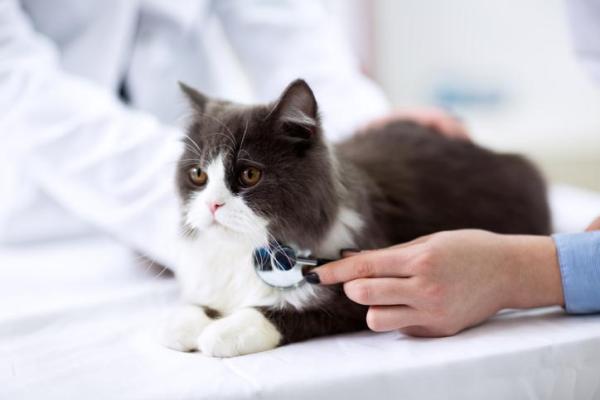
Congestive heart failure is a big concern for humans as it is one of the biggest killers. We may not think the relatively tiny hearts of cats will suffer the same issues, but this is unfortunately not the case. Congestive heart failure is quite a self-explanatory term. The arteries and blood vessels of the heart become congested, making it difficult for the organ to work as an effective pump. This results in the failure to oxygenate the blood properly. Any cat can develop the condition, whether pedigree or mixed breed, but does affect older cats more.
As this condition shows some generic or unspecified symptoms, it is imperative we keep an eye on even small changes in our cat's appearance or behavior. In this AnimalWised article, we detail the causes, symptoms and treatment of heart failure in cats so that we can detect and protect our cats from an often avoidable condition.
What is heart failure?
In medical terminology, ‘heart failure’ is a very general term for a range of conditions which stop the heart from functioning properly. This is usually a long process whereby the cardiac structures slowly decline to the point the heart simply fails to work. However, this is not always the case.
As heart failure is the inability of the heart to pump blood around the body, it can happen to any heart. This means it can affect cats and dogs in a very similar way to how it affects humans. All of these mammals need to oxygenate the blood and they need a heart to do so.
When an organism detects a failure of the heart or a drop in cardiac performance, it activates a series of palliative mechanisms so that its tissues can receive enough oxygen to survive. However, if the heart is worsened, these compensatory measures become ineffective and unsustainable. This means that, if not provided with proper treatment, a cat with heart failure can die suddenly and unexpectedly as the heart fails to function completely.

Structure and function of a cat's heart
A cat's heart, like that of a human's, is divided into two sections - left and right. Each of these has two chambers, an upper chamber and a lower chamber. These upper chambers are called ‘atria’ and the lower are called ‘ventricles’. Between the atria and the ventricles are the heart valves, the mitral valve perhaps being the most well-known. These valves control the blood flow between these cavities in the heart and allow it to remain in a stable condition.
The blood which enters the heart from the body does so through the right atrium so that it is pushed into the right ventricle. This blood is then taken to the lungs where it releases the carbon dioxide it has taken from other tissues in the body, then absorbs oxygen. This oxygenated blood returns back to the heart, entering through the left atrium and then into the left ventricle. From there it is pumped through the aorta to bring oxygen to the rest of the body.
Heart failure can occur due to any affected part of the heart. It can also affect the mitral valve generating so-called mitral insufficiency. The place of origin of cardiac failure will determine the evolution of the disease and can lead to specific symptoms.
In severe cases, heart failure in cats can evolve to a particularly worrying condition referred to as having an ‘enlarged heart’. This phenomenon originates when the left ventricle suffers an excessive and anomalous enlargement. It becomes so fragile, it loses functionality and is no longer able to pump blood around the body.
Possible causes of heart failure in cats
Usually, cardiac problems are related to various possible causes. In most cats, heart failure is relegated to a degenerative pathology called hypertrophic cardiomyopathy. This disorder causes the thickening of the walls of the myocardium, preventing the proper flow of blood through the cardiac cavities.
Many cats may also develop heart failure as a result of degenerative changes caused by diseases of the heart valves, the mitral valve being affected more frequently. These structural alterations cause blockages or deficiencies in the functionality of these valves, compromising the cardiac output.
Additionally, we can mention some conditions and causes associated with feline heart failure:
- Hyperthyroidism
- Arterial hypertension
- Fluid accumulation in the pericardial sac
- Congenital deformities in the walls or valves of the heart
- Endocarditis (inflammation of the heart valves)
- Presence of clots in cardiac structures
- Arrhythmias and heart rhythm disturbances
- Feline heartworm disease
- Cardiac neoplasms (tumors in the heart)
- Pregnancy

Symptoms of heart failure in cats
As mentioned at the beginning of the article, the first symptoms of heart failure in cats are often homogeneous and not very specific. Therefore, it is easy for many owners to ignore the primary signs of heart failure in cats such as lethargy or loss of apetite. Generally, they attribute this constant fatigue and weakness as part of the natural ageing process of the cat. As the cardiac output of the feline goes down, the characteristic symptoms of the insufficiency begin to appear.
Common symptoms of heart failure in cats include:
- Heart murmurs: when losing its ability to pump blood properly, the heart beats begin an anomalous pattern known as a ‘murmur’. These murmurs are easily detected through medical examination and are usually related to mitral valve insufficiency.
- Lethargy: with the worsening of cardiac damage, the feline develops a severe intolerance to any kind of physical effort. What previously could be described as disinterest in playing or eating develops into ful blown lethargy. It is a logical consequence of the progressive lack of oxygen in the body tissue.
- Heart rhythm and respiratory disorders: cats with heart failure may suffer a shortness of breath or end up breathing too fast. They may show either an accelerated or slower heart rate than normal. Each animal will present a specific alteration according to the state of their health.
- Weight loss: with low cardiac function, cats will lose their appetite and avoid the effort of feeding. The consequence is a rapid loss of weight and can lead to severe malnutrition.
- Abdominal swelling: cats with right ventricular insufficiency usually develop a condition known as ‘ascites’ which is characterized by the accumulation of liquid in the stomach and abdomen. This abdominal swelling results in the potbellied look some of our cats can exhibit.
- Pulmonary edema: felines with heart failure in the left ventricle usually show a high accumulation of fluid in the lungs. This condition is often known colloquially as ‘water in the lungs’.
- Coughing: a cough can appear in all cases of heart failure, revealing an alteration in the animal's respiratory rhythm. It appears most often during the night or after exercise. However, it is more commonly associated with left ventricle failure as it is also associated with the buildup of fluid in the lungs. When the condition is not properly treated, the animal may even start coughing up blood.
- Tongue, gums and grayish or bluish mucous membranes: this is a physical sign directly related to the poor oxygenation of tissues. We can observe the mucous membranes of the mouth, the eyes or the sexual organs.
- Fainting: an advanced heart failure usually causes fainting (medically known as a ‘syncope’), a serious symptom of the general weakness of the body. At this stage, the animal is vulnerable to sudden death or generalized paralysis.
Once again, we must emphasize the importance of going to a veterinarian when you are confronted by the change in behavior or habits of your cat. This will allow you to treat anything which requires immediate action.
Treatment of heart failure in cats
The treatment of heart failure in cats will depend directly on the cause as well as the cat's general state of health. An early diagnosis almost always allows for a better prognosis for cardiac disorders. This is why is is important to keep their health under consistent supervision and contact a vet when necessary.
When the condition is related to hyperthyroidism, for example, the treatment will be aimed at stabilizing the hormone production of the thyroid gland. On the other hand, congenital insufficiencies may require surgical intervention to resume the correct blood flow within the cardiac system.
However, we must bear in mind that heart failure in cats does not have a definitive cure. Its treatment, in the vast majority of diagnosed cases, is based on stablizing the general level of health of the cat. Also, we need to prevent the advancement of certain symptoms. The veterinarian may prescribe certain medications to maintain stable cardiac output and prevent fluid retention. Additionally, it will be essential to adopt a diet designed especially for cats with heart problems.
If the feline already has accumulation of fluid in the lungs and/or abdominal cavity, it will be essential to perform drainage of these areas. This will require assisted breathing, so will likely lead to hospitalization. With the correct treatment, it is possible for a cat with heart failure to regain its well-being and greatly improve its life expectancy.

Is it possible to prevent heart failure in cats?
Although we cannot change the genetic inheritance of our cats, we are able to offer a healthy routine to boost their immune system, improve physical resistance and avoid the complications provided by being overweight and a sedentary lifestyle. To begin with, we must provide our cats with a balanced diet as well as keeping then physically and mentally stimulated throughout their lives.
Remember to make periodic visits to the veterinarian for a check up every 6 to 12 months. This is in addition to following a proper vaccination and deworming schedule. Do not hesitate to call the right kind of professional when you identify any significant difference in appearance or demeanor of your cat.
This article is purely informative. AnimalWised does not have the authority to prescribe any veterinary treatment or create a diagnosis. We invite you to take your pet to the veterinarian if they are suffering from any condition or pain.
If you want to read similar articles to Heart Failure in Cats, we recommend you visit our Cardiovascular diseases category.